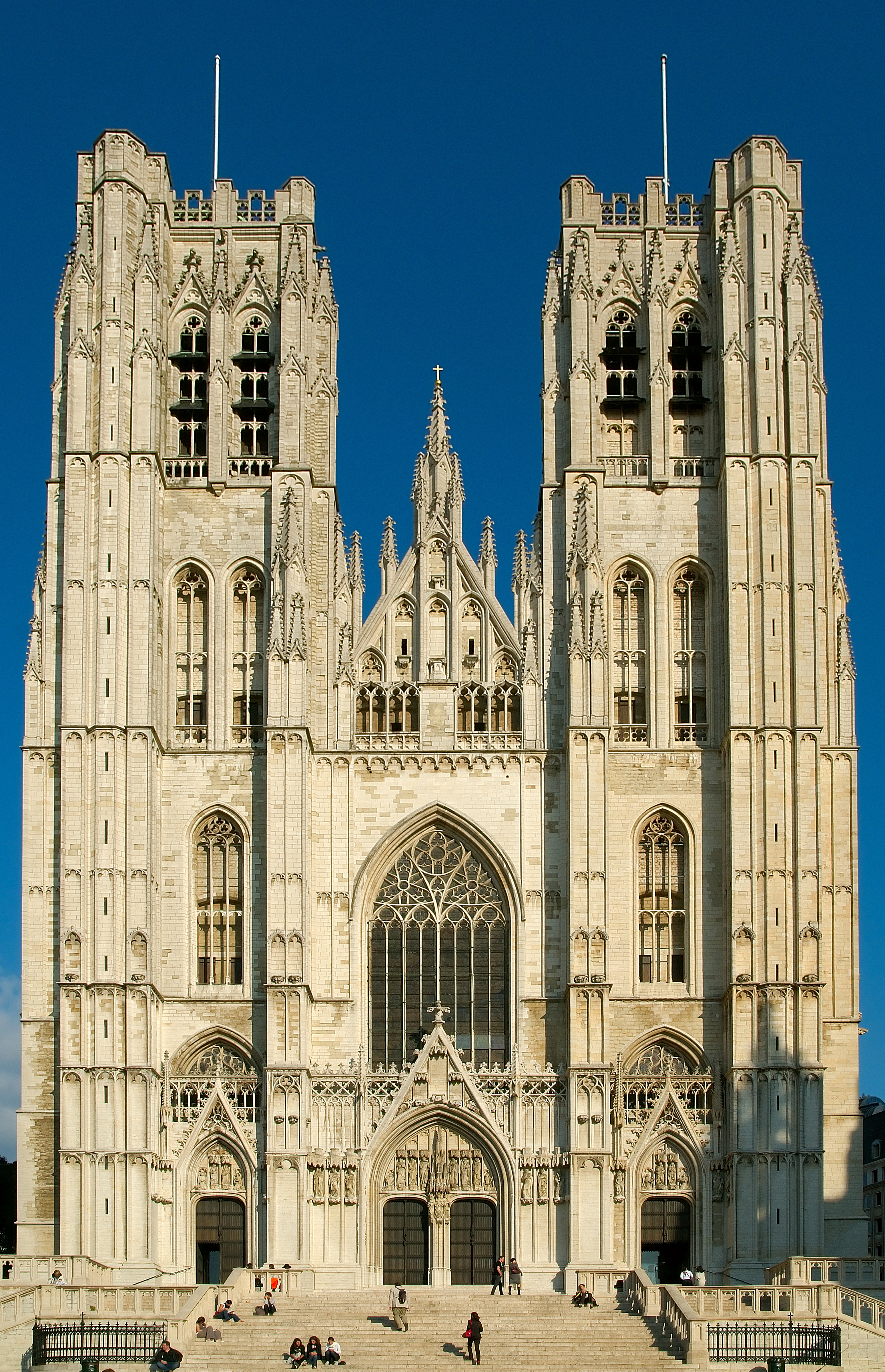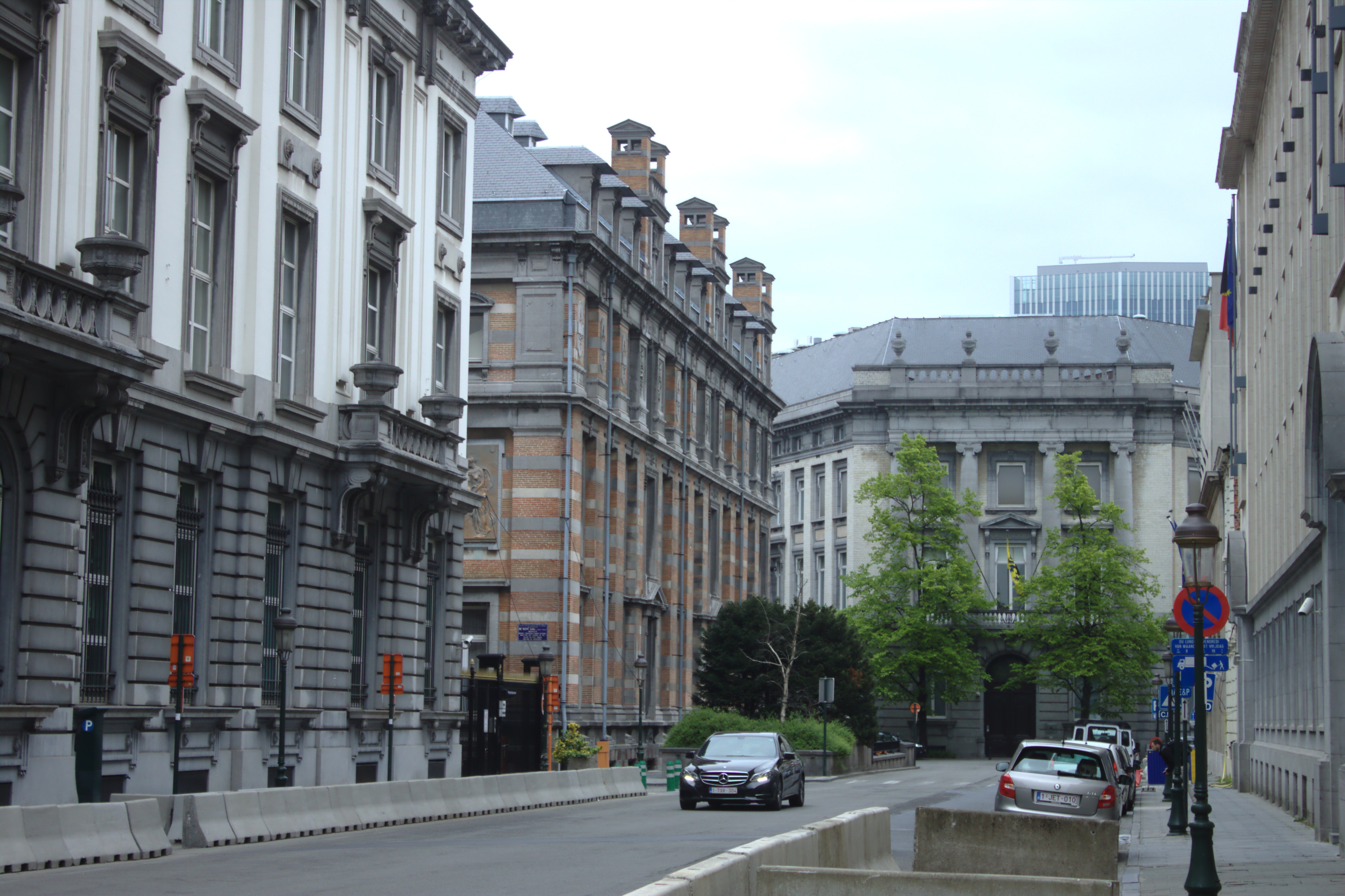|
Religion In Belgium
Religion in Belgium is diversified, with Christianity, in particular, the Catholic Church, representing the largest community, though it has experienced a significant decline since the 1960s (when it was the nominal religion of over 80% of the population). Belgium's policy separates the state from the churches, and freedom of religion of the citizens is guaranteed by the country's constitution. According to the Eurobarometer poll carried out by the European Commission in December 2018, the share of Christians increased by 10% points from 52.5% in 2009 to 62.8% in 9 years, with Catholicism being the largest denomination at 57.1%. Protestants comprised 2.3% and Orthodox Christians comprised 0.6%. Non-religious people comprised 29.3% of the population and were divided between those who primarily identified as atheists (9.1%) or as agnostics (20.2%). A further 6.8% of the population was Muslim and 1.1% were believers in other religions. On the other hand, the following Eurobaro ... [...More Info...] [...Related Items...] OR: [Wikipedia] [Google] [Baidu] |
GESIS – Leibniz Institute For The Social Sciences
The GESIS – Leibniz Institute for the Social Sciences is the largest German infrastructure institute for the social sciences. It is headquartered in Mannheim, with a location in Cologne. With basic research-based services and consulting covering all levels of the scientific process, GESIS supports researchers in the social sciences. As of 2017, the president of GESIS is Christof Wolf. GESIS is part of the Leibniz Association and receives federal and state funding. History Established in 1986 as German Social Science Infrastructure Services (), GESIS originally consisted of the three independent institutes: * Social Science Information Centre (, IZ) in Bonn, * Central Archive for Empirical Social Research (, ZA) in Cologne, and * Centre for Survey Research and Methodology (, ZUMA) in Mannheim. In 2007, the three GESIS institutes merged into one. In November 2008, GESIS added "Leibniz Institute for the Social Sciences" to its name in order to emphasize its membership in th ... [...More Info...] [...Related Items...] OR: [Wikipedia] [Google] [Baidu] |
Atheists
Atheism, in the broadest sense, is an absence of belief in the existence of deities. Less broadly, atheism is a rejection of the belief that any deities exist. In an even narrower sense, atheism is specifically the position that there no deities. Atheism is contrasted with theism, which in its most general form is the belief that at least one deity exists. The first individuals to identify themselves as atheists lived in the 18th century during the Age of Enlightenment. The French Revolution, noted for its "unprecedented atheism", witnessed the first significant political movement in history to advocate for the supremacy of human reason.Extract of page 22 In 1967, Albania declared itself the first official atheist coun ... [...More Info...] [...Related Items...] OR: [Wikipedia] [Google] [Baidu] |
Church Attendance
Church attendance is a central religious practice for many Christians; some Christian denominations, such as the Catholic Church require church attendance on the Lord's Day (Sunday); the Westminster Confession of Faith is held by the Reformed Churches and teaches first-day Sabbatarianism (Sunday Sabbatarianism), thus proclaiming the duty of public worship in keeping with the Ten Commandments. Similarly, The General Rules of the Methodist Church also requires "attending upon all the ordinances of God" including "the public worship of God". The Lutheran Christian theologian stated that church attendance is the "foundation for the Christian life" as "the Christian Bible and the sacraments provide the framework for the faith"; he also states that it is important for believers because it aids in the prevention of backsliding, as well as offers "the company of other believers". Until 1791, the government of the United Kingdom required attendance at church services of the Church of E ... [...More Info...] [...Related Items...] OR: [Wikipedia] [Google] [Baidu] |
Open Government
Open government is the governing doctrine which sustain that citizens have the right to access the documents and proceedings of the government to allow for effective public oversight. In its broadest construction, it opposes reason of state and other considerations which have tended to legitimize extensive state secrecy. The origins of open-government arguments can be dated to the time of the European Age of Enlightenment, when philosophers debated the proper construction of a then nascent democratic society. It is also increasingly being associated with the concept of democratic reform. The United Nations Sustainable Development Goal 16 for example advocates for public access to information as a criterion for ensuring accountable and inclusive institutions. Components The concept of open government is broad in scope but is most often connected to ideas of government transparency and accountability. Harlan Yu and David G. Robinson specify the distinction between open data an ... [...More Info...] [...Related Items...] OR: [Wikipedia] [Google] [Baidu] |
Flemish Parliament
The Flemish Parliament (Dutch: , formerly called Flemish Council or ''Vlaamse Raad'') constitutes the legislative power in Flanders for matters which fall within the competence of Flanders, both as a geographic region and as a cultural community of Belgium (unlike the French Community and Wallonia, which each have separate legislatures: the Parliament of the French Community and the Parliament of Wallonia). The Flemish Parliament approves decrees, which are Flemish laws, applicable to all persons in the Flemish Region, and to Flemish institutions in Brussels; it appoints and supervises the Flemish Government; and it approves the Flemish budget. The Flemish Parliament meets in the Flemish Parliament building in central Brussels, and its members and staff are housed in the House of the Flemish Representatives. History From 1830 until 1970 Belgium was a unitary state with a single government and a bicameral national parliament. The laws issued by Parliament applied to all Belgia ... [...More Info...] [...Related Items...] OR: [Wikipedia] [Google] [Baidu] |
Dutch Language
Dutch ( ) is a West Germanic language spoken by about 25 million people as a first language and 5 million as a second language. It is the third most widely spoken Germanic language, after its close relatives German and English. ''Afrikaans'' is a separate but somewhat mutually intelligible daughter languageAfrikaans is a daughter language of Dutch; see , , , , , . Afrikaans was historically called Cape Dutch; see , , , , , . Afrikaans is rooted in 17th-century dialects of Dutch; see , , , . Afrikaans is variously described as a creole, a partially creolised language, or a deviant variety of Dutch; see . spoken, to some degree, by at least 16 million people, mainly in South Africa and Namibia, evolving from the Cape Dutch dialects of Southern Africa. The dialects used in Belgium (including Flemish) and in Suriname, meanwhile, are all guided by the Dutch Language Union. In Europe, most of the population of the Netherlands (where it is the only official language spoken country ... [...More Info...] [...Related Items...] OR: [Wikipedia] [Google] [Baidu] |
Eastern Orthodoxy
Eastern Orthodoxy, also known as Eastern Orthodox Christianity, is one of the three main Branches of Christianity, branches of Chalcedonian Christianity, alongside Catholic Church, Catholicism and Protestantism. Like the Pentarchy of the first millennium, the mainstream (or "Canon law of the Eastern Orthodox Church, canonical") Eastern Orthodox Church is Organization of the Eastern Orthodox Church, organised into autocephalous churches independent from each other. In the 21st century, the Organization of the Eastern Orthodox Church#Autocephalous Eastern Orthodox churches, number of mainstream autocephalous churches is seventeen; there also exist Organization of the Eastern Orthodox Church#Unrecognised churches, autocephalous churches unrecognized by those mainstream ones. Autocephalous churches choose their own Primate (bishop), primate. Autocephalous churches can have Ecclesiastical jurisdiction, jurisdiction (authority) over other churches, some of which have the status of "Auto ... [...More Info...] [...Related Items...] OR: [Wikipedia] [Google] [Baidu] |
Anglicanism
Anglicanism is a Western Christian tradition that has developed from the practices, liturgy, and identity of the Church of England following the English Reformation, in the context of the Protestant Reformation in Europe. It is one of the largest branches of Christianity, with around 110 million adherents worldwide . Adherents of Anglicanism are called ''Anglicans''; they are also called ''Episcopalians'' in some countries. The majority of Anglicans are members of national or regional ecclesiastical provinces of the international Anglican Communion, which forms the third-largest Christian communion in the world, after the Roman Catholic Church and the Eastern Orthodox Church. These provinces are in full communion with the See of Canterbury and thus with the Archbishop of Canterbury, whom the communion refers to as its '' primus inter pares'' (Latin, 'first among equals'). The Archbishop calls the decennial Lambeth Conference, chairs the meeting of primates, and is the pr ... [...More Info...] [...Related Items...] OR: [Wikipedia] [Google] [Baidu] |
Karel Dobbelaere
Karel Dobbelaere (born 16 September 1933) is a Belgian educator and noted sociologist of religion. Dobbelaere is an Emeritus Professor of both the University of Antwerp and the Katholieke Universiteit Leuven (Louvain) in Belgium. He is past-President and General Secretary of the International Society for the Sociology of Religion. Academic career Karel Dobbelaere was born in Nieuwpoort in Belgium on 16 September 1933. He studied at the Katholieke Universiteit (Catholic University) in Leuven, where he received his doctorate in Social Sciences in 1966. He was appointed a professor at Katholieke Universiteit in 1968. He has done important work in the area of the place of religion in the social fabric, and how secularization of religious roles in public institutions affects both society and religion. He has done fieldwork with Bryan R. Wilson in researching new religious movements and sects. He also contributed for many years on the Social Sciences committee in Belgium's National Fund f ... [...More Info...] [...Related Items...] OR: [Wikipedia] [Google] [Baidu] |
Ganesha Festival Antwerp6
Ganesha ( sa, गणेश, ), also known as Ganapati, Vinayaka, and Pillaiyar, is one of the best-known and most worshipped deities in the Hindu pantheon and is the Supreme God in Ganapatya sect. His image is found throughout India. Hindu denominations worship him regardless of affiliations. Devotion to Ganesha is widely diffused and extends to Jains and Buddhists and includes Nepal, Sri Lanka, Thailand, Indonesia (Java and Bali), Singapore, Malaysia, Philippines, and Bangladesh and in countries with large ethnic Indian populations including Fiji, Guyana, Mauritius, and Trinidad and Tobago. Although Ganesha has many attributes, he is readily identified by his elephant head. He is widely revered, more specifically, as the remover of obstacles and thought to bring good luck; the patron of arts and sciences; and the deva of intellect and wisdom. As the god of beginnings, he is honoured at the start of rites and ceremonies. Ganesha is also invoked as a patron of letters a ... [...More Info...] [...Related Items...] OR: [Wikipedia] [Google] [Baidu] |
Yunus Emre Mosque, Genk
Yunus ibn Matta ( ar, يُونُس ٱبْن مَتّىٰ, Yūnus ibn Mattā) is a prophet and messenger of God (Allah). Yunus is traditionally viewed as highly important in Islam as a prophet who was faithful to God and delivered his messages. Yunus is the only one of the Bible's Twelve Minor Prophets to be named in the Quran.''Encyclopedia of Islam'', ''Yunus'', pg. 348 The tenth chapter of the Quran is named after him. In the Quran, Yunus is mentioned several times by name, as an apostle of Allah, and as Dhul-Nun ( ar, ذُو ٱلنُّوْن). Quranic mentions In Al-Anbiya 21:87 and Al-Qalam 68:48, Yunus is called Dhul-Nūn ( ar, ذُو ٱلنُّوْن, lit=The One of the Fish). In An-Nisa 4:163 and Al-An'am 6:86, he is referred to as "an apostle of Allah". Surah 37:139-148 retells the full story of Yunus:The Quran does not mention Yunus' heritage, but Muslim tradition teaches that Yunus was from the tribe of Binyjamin.''Encyclopedia of Islam'', ''Yunus'', pg. 348 Ha ... [...More Info...] [...Related Items...] OR: [Wikipedia] [Google] [Baidu] |

.jpg)


